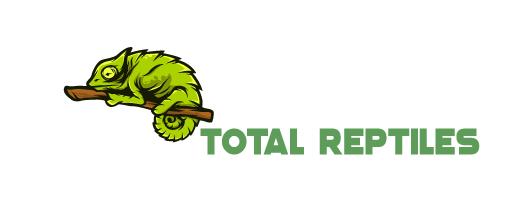Undoubtedly, bearded dragons cannot thrive and live healthily if they do not stick to a balanced diet. But regarding what’s in the diet, many wonders, do bearded dragons eat insects? If so, what insects do bearded dragons eat?
Bearded dragons eat a variety of insects. Some of the commonly included ones are crickets and dubia roaches. In addition, bearded dragons also eat super worms, silkworms, grasshoppers, hornworms, mealworms, and others.
But is that all you need to know about the insects that need to be inside the bearded dragons’ diet? Not really! There’s so much to explore. And you can get all the info required by continuing to read.
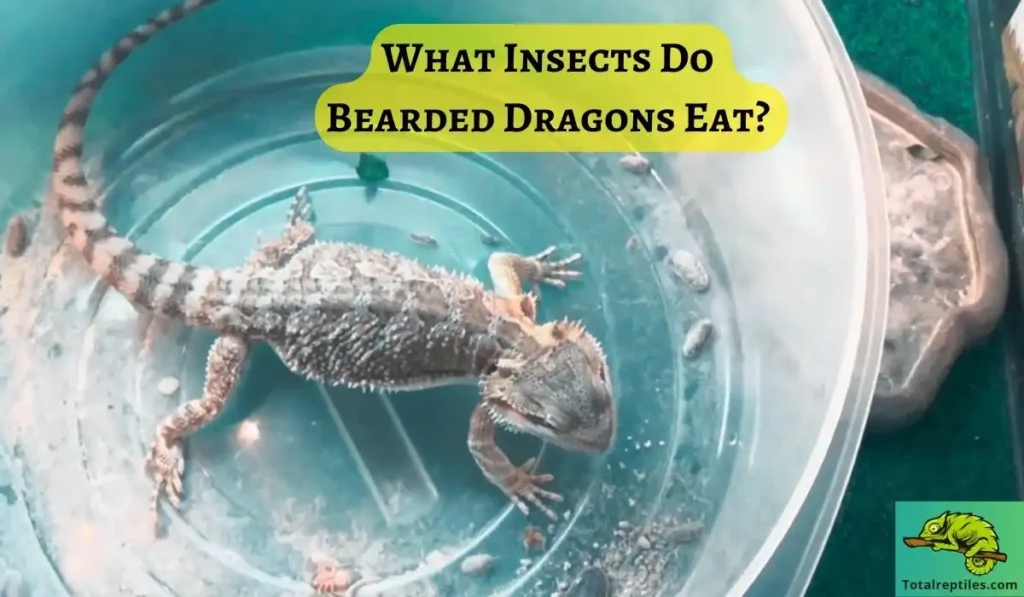
Why Is Insect Important in Bearded Dragons’ Diet?
Insects are a must in the bearded dragon diet for several reasons. Let’s further understand the topic through these key factors:
High Protein Requirement During Growth
By nature, bearded dragons are omnivores. That means they can eat both veggies and non-veg foods. However, during the growth phase, their bodies demand a diet that’s rich in protein.
Without getting the required amount of protein, bearded dragons cannot maintain muscle mass. And insects are a good source of protein for these reptiles. In fact, insects can also offer minerals and vitamins they need for healthy growth.
That includes calcium, enough of which can prevent metabolic bone disease in bearded dragons.
Insects Fill Up the Nutritional Needs of Bearded Dragons
The nutritional values of insects will depend on the type of insect. For example, mealworms offer a good amount of calcium and protein, while Turkestan roaches have a high moisture content and moderate fat content.
Nonetheless, the main highlight is that a mix of insects in the feed of bearded dragons will offer them the nutrition they need for proper growth.
What Bugs Can Bearded Dragons Eat?
So, bearded dragons can not eat all types of insects. There are some that are toxic to them (more on that later). Nevertheless, you have a ton of options! Take a look at the list below:
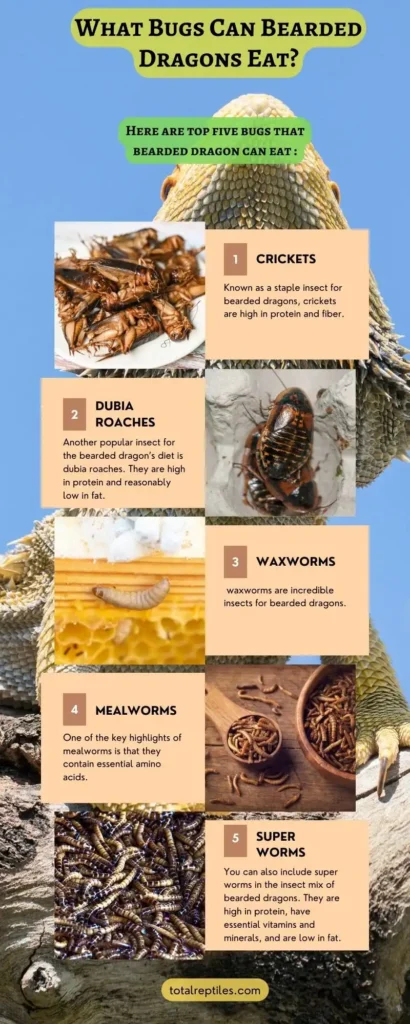
Known as a staple insect for bearded dragons, crickets are high in protein and fiber. In the diet of bearded dragons, it can also provide phosphorus and calcium. That makes crickets a must-have in the feeds.
Another popular insect for the bearded dragon’s diet is dubia roaches. They are high in protein and reasonably low in fat. And like crickets, these roaches contain calcium and other essential minerals.
- Waxworms
Although not common, waxworms are incredible insects for bearded dragons. But unlike Dubai roaches, these are high in fat and low in protein. For that reason, you should not add waxworms too frequently to the diet.
- Mealworms
One of the key highlights of mealworms is that they contain essential amino acids. In addition, these insects offer a high amount of protein to bearded dragons, allowing them to maintain proper growth.
- Super worms
You can also include super worms in the insect mix of bearded dragons. They are high in protein, have essential vitamins and minerals, and are low in fat.
However, do note that super worms are high in phosphorus. For that reason, you should include them with other insects that are high in calcium. Otherwise, the diet will not have the correct calcium-to-phosphorus ratio.
Alongside being an excellent source of protein, silkworms also contain essential amino acids. Moreover, they are high in calcium but low in fat, making them perfect for the insect mix.
- Grasshoppers
According to many bearded dragon keepers, grasshoppers are a healthy option for these reptiles.
Grasshoppers offer loads of calcium and essential minerals. But they are not easy to catch. So, you might have to rely on the packaged options, which can be pricey.
- Hornworms
A high-protein feeder insect that also offers plenty of essential minerals and vitamins. Hornworms are also high in moisture, making them a good pick if your bearded dragon is not drinking water.
While bearded dragons can eat spiders, it is important to consider the type of spider. Some spiders are toxic, which can lead to several health issues. Other than that, spiders are a good source of protein.
You can include fruit flies in the feed of bearded dragons. These are good sources of nutrition. Although, they are not easy to catch, which can make it hard to accumulate a good amount into the feed.
- Butter Worms
Like waxworms, butter worms are high in fat. For that reason, you should add them to the feed occasionally. Besides that, they are a good source of calcium and other essential nutrients.
- Locusts
Acting as a good source of protein, you can add locusts and make it a part of the balanced diet. But do note that locusts can be large in size. So, pick only the ones that are smaller to avoid digestive issues or choking.
13. Rolly Pollies
Bearded dragons can eat rolly pollies, also known as woodlice or pill bugs, as part of their diet. Rolly pollies are small terrestrial crustaceans that can be found in many outdoor environments. These insects are safe for bearded dragons to consume in moderation and can provide some variety to their diet.
Insects to Avoid Feeding Bearded Dragons
There are some insects that you need to avoid in the feed. They are toxic to bearded dragons and can cause several health problems. Some of them are highlighted below:
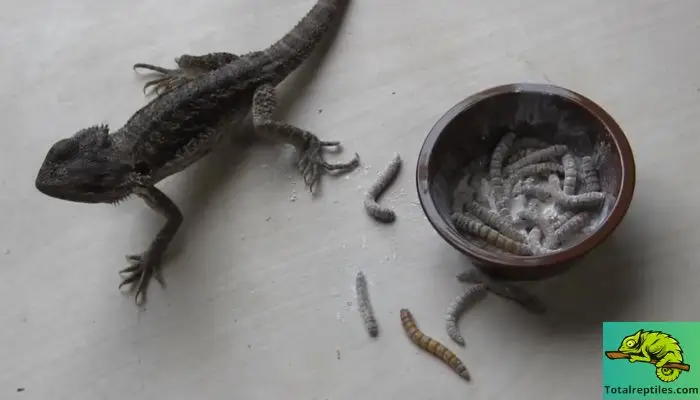
- Fireflies
One of the insects that is a must avoid in the feed of beaded dragons is fireflies. These insects contain toxins that are harmful to these reptiles.
- Lightning Bugs
Just like fireflies, you need to avoid lightning bugs. They also contain toxins, which will cause numerous health issues.
- Boxelder Bugs
The boxelder bugs contain a chemical that will cause health complications in bearded dragons. For that reason, these insects should be avoided.
- Ladybugs
Although ladybugs are easy to catch, you should not include them in the diet of bearded dragons. In most cases, ladybugs come with a parasite mite. And as you can guess, this parasite will cause health issues in bearded dragons.
Generally, earthworms are not toxic to bearded dragons. However, they might have pesticides and other chemicals in their skin. These chemicals will cause impaction in bearded dragons. So, you may better avoid them.
6. Ants
If you plan to feed your bearded dragon ants, it’s safer to use commercially-bred insects from a reputable source rather than collecting them from the wild. Wild-caught ants might carry parasites or have been exposed to pesticides, which can be harmful to your pet.
7. Stink Bugs
Bearded dragons should not eat stink bugs. Stink bugs are not a suitable food source for bearded dragons or any other reptile. Stink bugs, also known as shield bugs, produce a foul-smelling and potentially toxic liquid as a defense mechanism.
How to Feed Insects to Bearded Dragons?
There are various ways to feed insects to bearded dragons. Some might work the best for your pets, while some might not. For that reason, you should experiment with them. And here’s a description of each of the feeding methods:
Mix Insects with Veggies
You can mix the insects with leafy greens and vegetables. This mix will act like a protein-infused salad. And it will be easy to digest too. Want to know why? The leafy greens have high moisture content, making the mixture easy to much on.
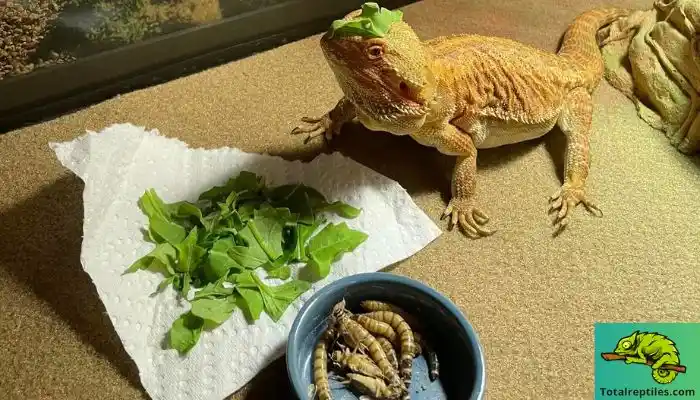
Drop the Bugs Inside the Tank
There’s no need to hand-feed the insects to the bearded dragons. You can just simply drop the bugs on the tank. However, it might not work well for baby dragons, as they require some assistance. But it will work perfectly for adults and juveniles.
Dust the Insects with Supplements to Enhance the Nutrition
To maximize the nutrition intake of the bearded dragons, you can dust the insects with some vitamin D3 and calcium supplements. However, you should not put in too much of supplements. Instead, lightly dust and coat the insects.
How Often Should You Feed Your Bearded Dragon Insects?
The frequency of feeding the bearded dragons with insects will depend on their age. Baby bearded dragons, for example, will require multiple feeding. To be exact, bearded dragons under 3 months of age will require five feedings per day.
On the other hand, babies from 3 to 6 months old will require 3 to 4 feedings daily. Finally, juveniles require 3 feedings, while adults can have 2 to 3 meals each day.
Now, the important part is that the babies and juveniles need to have a diet that’s 80% percent insects and 20% vegetables. That means the juveniles and babies must be fed insects three times a day.
How Many Insects Should a Bearded Dragon Eat?
The number of insects that bearded dragons should eat will depend on their age, size, and overall activity level. But in general, baby bearded dragons must need to eat 6 to 10 small-sized insects, while adult dragons should eat 10 to 12 medium-sized ones.
Juveniles, on the other hand, eat the most insects. They can have 20 to 50 insects per day. And if you consider small crickets, juveniles can eat 30 to 80 crickets each day.
Nonetheless, the general rule is to let the breaded dragons eat as many insects as they can in 15 minutes. Offer a bowl full of insects and let them enjoy it.
And after 15 minutes, remove the bowl and clear out any remaining insects in the tank.
Can Bearded Dragons Eat Dead Insects?
It is not safe for bearded dragons to eat dead insects. First, dead insects tend not to have as much nutritional value as live insects. And as discussed earlier, insects should offer 80% percent of the nutritional requirement for babies and juveniles.
Secondly, you will lower their activity level by making the bearded dragons feed on dead insects only. The thing is, when bearded dragons eat live insects, they hunt them down.
Finally, dead insects can attract parasites and bacteria. And if bearded dragons eat these contaminated insects, they will become ill. In fact, even commercially packaged dried insects should be avoided if possible.
Final Words
Are you still wondering what insects do bearded dragons eat? To recap, even though these reptiles can eat a variety of insects, the most common insects for them are dubia roaches and crickets.
Along with them, you can also feed super worms, grasshoppers, silkworms, hornworms, and mealworms to the bearded dragons. But no matter what, make sure not to feed them insects that are toxic. They will fall sick and potentially die!
